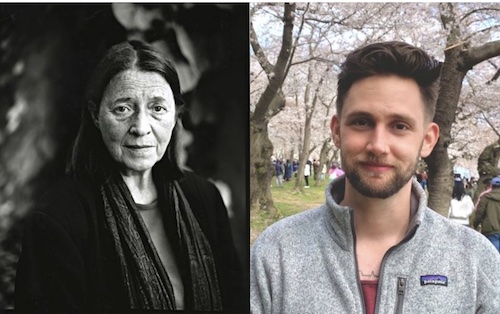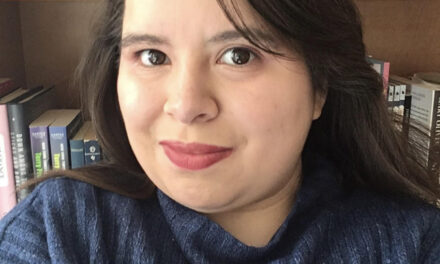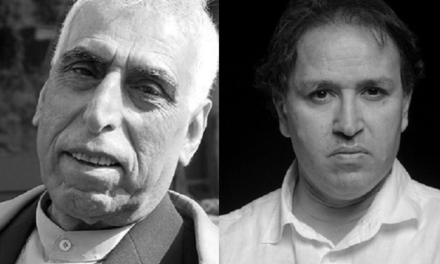Assistant Editor Haley Crigger: Language fascinates most writers: its power, ineptitudes, charms, and (yes) difficulties are some of the reasons most of us were pulled into the profession. Attempting to convey the nature of language through language can feel like chasing one’s tail, the same sensation I get while trying to decode Saussure’s signifier and signified. All that to say, I am a sucker for any writing that manages to convey the marvelously bitter relationship we all have with our mother tongues.
Birgitta Trotzig’s “Language Difficulties” describes just how impossible it is to say what one means, and how the constraints of language intersect with and even inform the shackles of adulthood and polite society. Its earnest efforts to break through are simultaneously tender and frightening, something like a creature skittering in the walls. Add to these feelings the phenomenon of Harmon’s translation from the text’s original Swedish (which he describes below in a translator’s note), and the sounds are that much more arresting, even harrowing.
To hear Brad read the piece, click below:
Language Difficulties
First published as the untitled preface to Trotzig’s essay collection Jaget och världen (1977).
The relationship to reality is what matters.
When it comes to what really happens to me in life, I’m struck into silence. Silence! Stop sign—zone border! It becomes nearly physically impossible for me to as much as register facts, dates—at least intermittently. The real-life event hits me—massively burdensome, complicated, overwhelmingly intangible—and transforms all speech, any form of direct articulation, into a surreal rustle of leaves.
And yet, all the while, I sense deepest down, as strongly as if it were the force of life itself, the desire to survive, that I somehow must connect with that real-life event in words, reach out to it, engage with it, receive warmth from it.
Speech is compromised, words are divided between the machinery of speech and the element of coldness and concealment.
Words conceal their facet of life inward, project a cold marionette-face outward. They must be unclothed. They must sink down into a bath. Their relations to each other must be changed, transformed.
The real event. Impossible to imagine transmitting stiff-skinned hard-scarring wounding fragments of reality, the words within the domains of the burning heart.
But nor is it a question of coming, transmitting. They want to go there—into the in-some-way-forbidden zone. They want to go there like a moth to the light.
You don’t choose. You enter into a forest, the forest comes with surprises. You don’t choose language, you don’t decide between speech or silence. You tag along. It becomes what it becomes. It gives. It’s given.
(Fly calmly—calmly. Straight ahead, straight ahead. Do not look around. Ever. Then carry the foreign air.)
(Wait, wait.
I sometimes think that I’ve spent my entire life on different sofas, beds, chaise lounges, lying and staring into the ceiling and waiting. I have—in reality—an iron patience that I had never believed about myself.
Wait. So we try it all over again. Carefully. In the wrong key. Wait again.
Wait. Years pass. But one day you’ll hear the grass grow.)
Is language a barrier to contact or a means to nearness?
The originary experience: that ordinary speech lies.
The wondrous perception I had when I was a child, that adults, among themselves, never said what they really meant (and never met people that they really liked). The adults: they only said to each other what they were forced to say (and they never actually had any real friends, they “socialized”).
This wondrous perception I’ve also had with me for my whole life, like a millstone around my neck, a constant obstacle to overcome: the feeling of speaking with someone in ordinary speech, that it is a falsification.
Cracks, desertions, silences, slips of the tongue: those stammering eruptions are what guide the way of a conversation—which gives the sense that another, richer language begins to move within the impersonal machinery of formulas.
Translator’s Note:
Birgitta Trotzig once said in an interview that, for her, “everything begins with an image.” This is perhaps more pronounced in her novels or prose poems, but in the short piece “Language Difficulties,” we get a glimpse into her mentality. Originally published as an untitled preface to a 1977 collection of critical essays, The Self and the World, it shows the sporadic rhythm of her prose, resembling thought that meanders with intention, or perhaps an extended moment of quiet ecstasy or gentle epiphany. While it might technically be prose, its spirit, its rhythm—indeed, its breath—is that of poetry.
Trotzig wrote across many genres—essays, novels, stories long and short, prose poems—but all her writing is poetic, in that there’s an urgency to it, from the momentum of the moment. Poetic also in that Trotzig tweaks convention; even in her prose, she experiments with syntax and punctuation, antiquates her register and her lexicon, juxtaposes parataxis with hypotaxis. And poetic in that for Trotzig, literature is a spiritual experience, where language reveals some kind of truth as it unfolds, revealing with it a previously hidden angle of experience.
For me, “Language Difficulties” is about the sensation of being carried by language, ostensibly by our native tongue, with all its essential mystery. As a text translated into English, it also becomes, however inadvertently, a statement on translation. Trotzig writes, “You don’t choose. You enter into a forest, the forest comes with surprises. You don’t choose language, you don’t decide between speech or silence. You tag along.” These statements take on another valence here, for I am indeed choosing, in my transfer from Swedish into English. What for Trotzig is perhaps a matter of mystical inspiration becomes for the translator a careful consideration of craft. The translator occupies a mystical space between language, beholden to the orders of both, limited in their capacity to stretch either language’s logic.
The joy and the challenge of translating Trotzig—as with any text and author—is how to render the blooming of the text in a new language. In the space of translation, as in the realm of everyday life, when language breaks down, ruptures, stutters, or pauses—those are the moments, the openings, and the opportunities for us to tune our attention, like a piano, to the world and to continue playing.
Birgitta Trotzig (1929–2011) is one of the twentieth century’s most revered Scandinavian authors. She wrote across many genres and is particularly acclaimed for the 1982 prose-poem collection Anima, the 1972 novel The Malady, and her 1985 masterpiece The Marsh King’s Daughter. She was elected to the Swedish Academy in 1993 and awarded many of the major literary prizes in Sweden. Her work has been translated into over a dozen languages.
Bradley Harmon (b. 1994) is a writer, translator, and scholar of Scandinavian and German literature, philosophy, and film. His work has appeared in Poetry, Astra Magazine, Firmament, Chicago Review, Tupelo Quarterly, and Swedish Book Review and his book translations include Birgitta Trotzig’s The Marsh King’s Daughter and Monika Fagerholm’s Who Killed Bambi? He was invited to the 2021 Översättargruvan translation workshop in Sweden, placed second in the 2022 Anne Frydman Translation Prize, and is a 2022 ALTA Emerging Translator Fellow.











